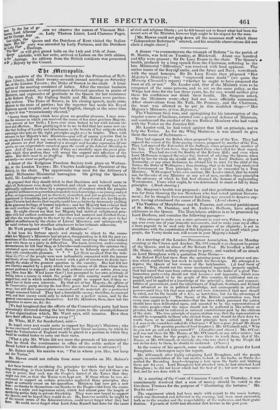At a meeting of the London Precursor Association, held on
Monday evening at the Crown and Anchor, Mr. O'Connell was eloquent in praise of the Queen, and in abuse of Sir Robert Peel. He levelled a blow at Mr. Hume, which nobody attempted to parry, and warded off an attack on Lord Brougham with a quotation from Sterne—
Sir Robert Peel had risen from the spinning-jenny to that power and sta- tion which enabled him last week to insult his Sovereign. He attempted to deprive the Queen of her women of the bedchamber. (A loud burst of groans.) W by should not the same mechanical ingenuity, properly applied, that had raised that man from cotton-spinning to be the leader of a great Par- liamentary party—why should not that keenness and ingenuity, which were largely participated in by the people of this country, be cultivated and ex- panded, and be applied to a knowledge of the principles, duties, and responsi- bilities of government, until the inhabitants of England, Scotland, and Ireland ; had advanced so far in political knowledge, and consequently in political power—until they felt that men ought and were determined that men should be ruled, not for the benefit of a few, as heretothre, but for the advantage of the entire community ? The theory of the British constitution was, that every man ought to be represented—that the laws which governed the nation should have been deliberated upon, and assented to by the representatives of the entire people—that the taxes should not be gathered in like robbery or plunder, but should be collected as rational contributions paid by the citizens of the state. The true principle of representation was, that the representatives should be responsible to those who elected them, and should do their duty to- wards them or be cashiered. Had that principle been acted upon now? (A man in the crowd here asked the Chairman" U here is your friend Mr.11ume to-night The question produced kind laughter.) Mr. O'Connell said, " Why do you not go and ask him yourself?" (Lung/tier and cheers.) Mr. O'Con- nell was not there for Mr. liume, or Mr. O'Connell, or any other mister ; but but he was there for the people; be was there to teach them, that if Mr. Hume, or Mr. O'Connell, or anybody else who was elected by the People did. net do his duty to them, he should be cashiered. ((heers.) In the course of his speech, some remarks elicited a groan for Lord Brougham; whereupon says the report,
Mr. O'Connell, after highly eulogizing Lord Brougham, said the people ought, in consideration of his vast merits, to look at his faults, as Sterne de-
scribed the Recording Angel—dropping tear upon the faults and blotting them out for ever. Lord Brougham had attacked him, he had attacked Lord. Brougham ; he did not know which bad the best of it ; but new he was satis- fied, and he was done with it.


























 Previous page
Previous page